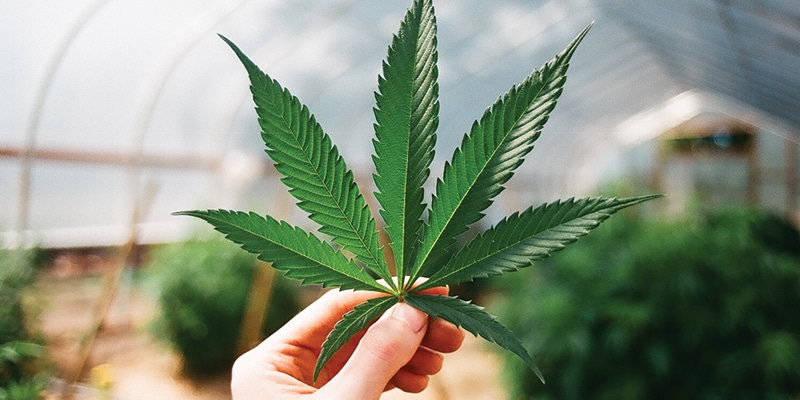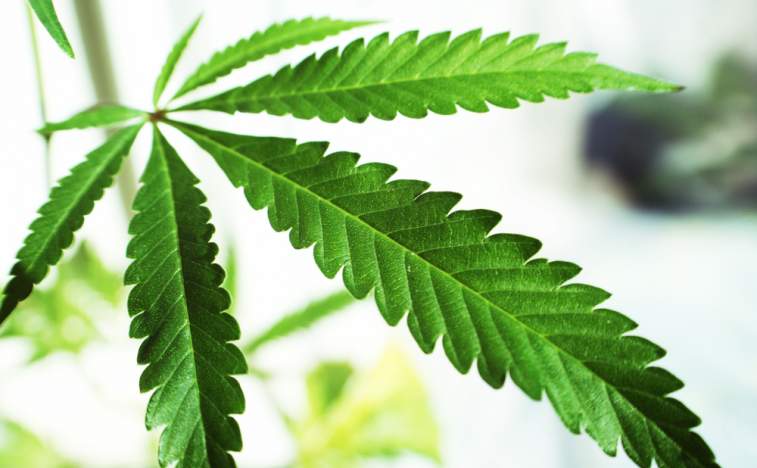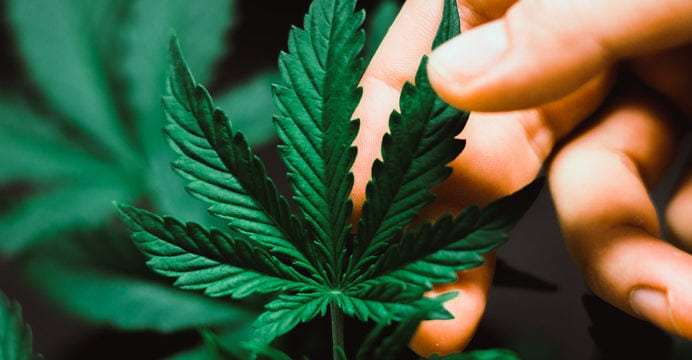CBD CONDITIONS & TREATMENTS
CBD Treatment of ALS

Amyotrophic lateral sclerosis, or ALS for short, is a tragic disease defined by a neurodegenerative pathogenesis centering on the destruction of motor neurons associated in the motor cortex with voluntary movement, and an associated atrophy of the muscles controlled by those neurons.
Many people know this disease as Lou Gehrig’s disease. It affects a very small portion of the population but has become notorious because of both the story of Lou Gehrig and that of genius theoretical physicist Stephen Hawking, who, by the time he recently passed away, lived nearly 10 times as long as he was supposed to.
Essentially, ALS is about the death of motor neurons in the brain and spine. Once initial symptoms are seen, an individual generally experiences complete physical paralysis within just a couple of years. Since symptoms are only shown after over 30% of the motor neurons have already died, it is basically impossible to catch the disease early.
We don’t really know what causes the disease at this time, and there is no known treatment.
CBD and ALS
One of the interesting things we find as we examine the various and sundry conditions most effectively addressed and treated by CBD is a remarkable correlation with a lack of understanding where causality is concerned. In other words if it’s a tragic health condition that has a completely unknown cause, it seems, by the magic of the universe, to be particularly suited to treatment or therapy through application of cannabidiol, or CBD.
ALS is a particularly good example of this phenomenon. There is only one prescribed treatment of ALS – a glutamate receptor inhibitor known as Riluzole. This medication is meant to decrease the rate at which neurons combine with glutamate. This can prevent some of the excitotoxicity, but is far from a cure.
However, CBD has shown some promise in working to slow several of the drivers of the progression of ALS including excitotoxicity, neuroinflammation, and oxidative stress. In addition, as mentioned in other spots, CBD also works as a palliative and a treatment for some of the psychological stressors that accompany the more direct physiological symptomology associated with ALS.
In other words, it can function as a mechanical inhibitor – at least, we believe at present – and also work to mask some of the more dramatic immediately experienced symptomology. This makes it another case where CBD is somewhat of a double whammy solution, which is one of the reasons why this substance seems to be so dramatically interesting to cutting-edge research currently being entertained on the frontier of medical science.
It is thought that one of the central reasons why CBD can be effective in terms of the mechanical drivers of the cell death associated with ALS is because of the relationship between CB2 receptors and microglial cells in the brain.
These cells function as effectively the immune system of the brain. This is necessary because typical immune related cells are not allowed past the blood brain barrier that separates this important system of the body.
Since CBD agonizes the CB2 receptors, it is able to reduce the death of healthy neurons based on activation of neurotoxic mediators. Importantly, as we understand it now, this active pathway can be affected without compromise of immunity more generally.
This is extraordinarily promising, and we expect further research to ensue to confirm and extend these conclusions, and possibly push CBD to the forefront of the treatment horizon as we continue to search for new strategies to battle ALS.
BENEFITS OF CBD
What Works Best for Treating Pain with CBD Tincture, Soft gels or Creams? #CBD Tincture #Best All Organic CBD Cream

Cannabidiol (CBD) products such as oils and topicals have become a popular natural remedy for pain. While research is still underway, first-person accounts of the benefits are taking the world by storm.
New products are popping up in every direction you look from CBD oil and CBD tinctures to CBD cream and CBD soft gel capsules. So, no matter your preference, there is a form of CBD to help you treat your pain. Treating pain and inflammation is part of the many benefits that CBD offers the user. Let’s take a deeper look into CBD and pain:
What is CBD and will it make me high?
Many people are skeptical of using CBD as a remedy because of the connotations that come with using a compound that comes from the cannabis or hemp plant. In fact, CBD is the non-intoxicating compound of the cannabis plant and will not make you ‘high’ as if you were smoking marijuana.
The more well-known compound of the plant, THC (tetrahydrocannabinol) is what creates the high. Some CBD oils carry trace amounts (less than 0.3%) of THC. However, oils derived from hemp rather than cannabis do not contain any THC and these are legal in all 50 states across the USA.
How CBD works to reduce pain
When it comes to CBD and pain, this affects the endocannabinoid system in the human body. The endocannabinoid system creates endocannabinoids (its own cannabinoids). The system receives and translates signals from the endocannabinoids and any cannabinoids from CBD products throughout the body.
The endocannabinoid system regulates a variety of functions in the human body. These include immune system responses, sleep and most notably, pain. While CBD does not directly affect the endocannabinoid system according to available research, it does initiate the activation or inhibitions of certain compounds in the body.
CBD in the body can cause a reduction in the absorption of anandamide, a neurotransmitter that helps to regulate pain. Thus, CBD will cause the body to absorb less anandamide, increasing levels in the bloodstream, leading to relief from pain.
The effects of CBD on inflammation to treat pain
Inflammation is the body’s protective response against harmful stimuli. Inflammation is often accompanied by pain, redness and swelling. By treating the cause of the inflammation, you can relieve the pain you might be feeling.
This is one of the most popular ways that CBD is being used as a natural alternative remedy. Since inflammation is one of the body’s immune responses, it is regulated by the endocannabinoid system. So, once again, CBD interacts with neuroreceptors in the body to deliver an anti-inflammatory effect.
By reducing areas of inflammation in the body, CBD can, therefore, help to relieve the pain caused by inflammation. Sometimes the body triggers inflammation when there is no harm done to the body, such as in the case of many autoimmune diseases. CBD oil can greatly help remedy the symptoms of these diseases.
Finding quality CBD products
When using CBD products to relieve pain, you want to find a high-quality CBD product. Be sure to check the details of the oil, tincture or topical that you intend to buy. You want to look for information such as the THC percentage and ensure it is a hemp-derived CBD (especially if you live in a state that has not yet legalized marijuana).
Purchasing your CBD products from a trusted supplier like Greenleaf Farms will ensure that you are receiving a high-quality product. Their hemp is grown under the perfect conditions with no pesticides or herbicides used.
When purchasing from a trusted supplier, it generally comes with the guarantee that you are receiving a pure and authentic CBD to treat and relieve your pain and inflammation. You can also rest easy knowing that your CBD product has been produced with care and your health in mind.
BENEFITS OF CBD
CBD and Depression Treatments

Harvested from the marijuana plant, cannabidiol (CBD) is extracted from the leaves after harvesting. Although marijuana is known for its mood-altering components, CBD is not one of them. The THC (tetrahydrocannabinol) in cannabis is the main compound in marijuana that causes this effect.
CBD products have minimal traces of THC in them, so there is no chance that this compound can have any adverse effects on the user. The legal requirement is that CBD must contain 0.3% or less THC. Producers who don’t comply risk having their product seized and growing license revoked. The tiny amounts of THC mean that CBD cannot cause the stereotypical high that most people associate with marijuana use.
There are several CBD products the user can choose from, including CBD oil, CBD ointment, and CBD tincture. The conditions it is used for prescribes how CBD should be ingested. Greenleaf Farms’ products come in a large range designed to suit the needs of any user.
As more and more people turn to CBD as an alternative remedy, the list of conditions for which it is recommended is growing. Among them is CBD and depression.
Is there a connection between CBD and depression support?
Depression is caused by a chemical imbalance in the brain. The neurotransmitters that are responsible for communication between the brain and the rest of the body are out of sync. The neurotransmitter most associated with depressive disorders is serotonin.
CBD has been shown through studies to interact positively with the serotonin neuroreceptors in the brain. This helps to maintain healthy serotonin levels.
Serotonin is essential for a feeling of well-being. It can govern a person’s emotional state. An imbalance can cause havoc on a person’s emotional and physical health.
Most people with depression have to take antidepressant medication. The most common antidepressant is fluoxetine, which people may know by the name Prozac. Prozac is an SSRI (Selective Serotonin Reabsorption Inhibitor). The drug prevents the body from losing serotonin through reabsorption into the body. This function allows SSRIs to help maintain steady serotonin levels in the brain of the user.
Other neurotransmitters targeted by certain antidepressants are noradrenaline and dopamine. When an SSRI doesn’t produce the desired result, a doctor will prescribe these drugs to a patient.
The side effect debate
While pharmaceutical drugs might be helpful to a depression sufferer, they have a lot of side effects. These include:
- A notable increase or decrease in appetite
- Weight gain or loss
- Changes in sleep patterns
- Mood swings
- Sexual dysfunction such as a loss of the libido
In addition to these side effects, antidepressants may have the opposite effect of that which is desired. This can lead to deepening depression, thoughts, and acts of self-harm, suicidal ideation, and the act of suicide itself.
Another serious implication of taking antidepressants is that some of them are habit-forming. The patient develops a dependence on them, which may be hard to quit.
While CBD has its own side effects, many users report that they are less severe than those of antidepressants. The side effects of CBD are similar to those of most antidepressant medication.
Is there a real possibility that CBC can help patients with depression?
While CBD has been shown in animal studies to have an antidepressant-like effect on its subjects, it is by no means an antidepressant. Scientists are still studying how it works. However, what has been discovered to date bodes well for CBD as a potential treatment for depression.
As a natural remedy, CBD is easier for the body to process, unlike prescription drugs. People who favor a more organic approach to treatment are turning to CBD in the hopes that it will reduce or eliminate the need for antidepressants.
People in treatment should NEVER abandon the medication regime their doctor has prescribed. Doing so can pose a severe threat to their future well-being. An alternative such as CBD oil should always be discussed with a medical professional before implementing its use.
BENEFITS OF CBD
Can CBD cure Colitis and Crohns?

Colitis and Crohn’s are two diseases with a number of similarities, and both characterized by gastrointestinal (GI) inflammation. However, the two are different in subtle ways that affect the kind of care given to people that have them.
Both diseases are currently treated in the same way – through proper use of medication that targets the inflammatory response and reducing symptoms. Particularly, reducing the frequency of flares – referred to as maintaining remission – is a useful goal. With the proper administration of treatment, periods of remission can be extended, and the frequency of flares reduced.
One of the emerging methods that have been under study and shows great potential for future drugs is CBD oil, perhaps due to its anti-inflammatory properties.
Current methods of diagnosis and treatment of colitis and Crohn’s
Crohn’s disease and ulcerative colitis are both inflammatory bowel diseases (IBDs) that are characterized by uncontrolled inflammation. This results in gastrointestinal symptoms, and, if left unchecked, necessitates surgery or may lead to disability.
Currently, we do not know what causes them nor do there exist drugs for treating them. At best, people suffering from the condition can have their quality of life improved by controlling the symptoms, inflammation and carrying out immune-based therapies.
More recent advancements in medicine have enabled the management of these symptoms through a process referred to as ‘deep remission.’ This involves objective evidence of biochemical changes in the bloodstream and has been attributed to marked improvements in patients’ well-being.
Despite these advances, there are still significant gaps in the treatment process of IBDs. A lot of patients suffer nonspecific symptoms such as loss of appetite, fatigue, nausea, and weakness. With the rise of CBD into the spotlight, especially after the legalization of hemp-sourced CBD oil, CBD and Colitis and Crohn’s ought to be tangled together in the near future.
All evidence we have so far seems to suggest that CBD can help in the management of the disease. Despite being renowned for its anti-inflammatory properties, there isn’t any definitive proof of it controlling inflammation in this case. Instead, it helps to keep a number of other symptoms in check.
Role of CBD in managing colitis and Crohn’s
Inflammation is an immune system response to attacks by foreign bodies. It helps to prevent infection and kill pathogens, but can also be harmful if it goes on for a long time. Often, the immune system goes awry and begins attacking itself, as is the case with Crohn’s disease, where the gut is continually under attack.
It’s also worthwhile noting that the human body is composed of networks of neurons and receptors found all over the body. The endocannabinoid system (ECS) is one such network, composed primarily of CB1 and CB2 receptors. The ECS is responsible for maintaining homeostasis in the body, including everything from controlling hunger, reacting to pain and controlling the circadian rhythm.
CBD oil has been shown to effectively combat nonspecific symptoms such as nausea, reducing pain and, most important of all, reducing inflammation. Scientists have not reached a solid conclusion regarding the latter of these effects, especially with regards to CBD and Colitis and Crohn’s disease.
Empirical and anecdotal evidence seems to point towards improvement in patient’s general health, work productivity and social functioning, and a subsequent reduction on pain and depression in patients. CBD has also been demonstrated to be very helpful in the relief of abdominal pain, diarrhea and an increase in appetite.
Each of these are currently known effects CBD tends to have on the body, and it doesn’t come as much of a surprise the same can be achieved in people with Crohn’s/Colitis. Major CBD outlets lime Greenland Farms have also routed a decrease in the need for Colitis-related medication upon the use of CBD oil for treatment.
We may not currently have concrete evidence to support the action with which CBD is thought to act, but it definitely leads to a definite improvement in the quality of life of people with Crohn’s/Colitis.







2 Comments